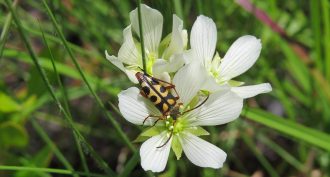Life
-
 Animals
AnimalsKiller whale blows a raspberry, says ‘hello’
Orcas can mimic a range of sounds, including human speech — sort of.
By Susan Milius -
 Brain
BrainScientists Say: Receptor
This molecule is a chemical messenger’s docking station. A receptor serves as a lock for cell activity.
-
 Brain
BrainCool Jobs: Decoding how your brain ‘reads’
For some stroke victims and people with dyslexia, reading is nearly impossible. These researchers are working to understand why.
-
 Animals
AnimalsTricky turns give prey a chance against lions and cheetahs
A bonanza of running data on wild predators shows that a successful hunt requires more than sprinting.
By Susan Milius -
 Ecosystems
EcosystemsExploring the mysteries of Cuba’s coral reefs
Researchers are studying the mysterious lives of creatures in and near Cuba’s coral reefs. What they learn could help protect ocean life globally.
By Bryn Nelson -
 Ecosystems
EcosystemsMigrating crabs take their eggs to the sea
Cuba’s colorful land crabs connect swamp and sea with their yearly mass migrations. Protecting their routes can help other animals too.
By Bryn Nelson -
 Health & Medicine
Health & MedicineTeens win big prizes for research on potato killer, vaping and a rare disease
The Regeneron Science Talent Search awarded more than $2 million in prizes this year. This year’s top winners tackled plant disease, vaping and more.
-
 Genetics
GeneticsScientists recruit bloodsucking leeches as research assistants
By analyzing a slimy, bloodsucking leech’s last meal, scientists can identify which animals had been living near it.
By Yao-Hua Law -
 Genetics
GeneticsExplainer: DNA hunters
Snippets of DNA can be left behind by a passing organism. Some researchers now act as wildlife detectives to identify the sources of such cast-off DNA.
-
 Plants
PlantsVenus flytraps tend not to eat their pollinators
A first-ever study of what pollinates a Venus flytrap finds little overlap between the critters that serve as pollinators and those that are prey.
-
 Health & Medicine
Health & MedicineScientists Say: Ectoparasite
Many people think of parasites as organisms that live inside their hosts. But some of them can be found on the outside instead.
-
 Fossils
FossilsAncient jaw suggests humans left Africa earlier than thought
A fossil jaw found in a cave in Israel is at least 177,000 years old. The scientists who found it think it shows humans left Africa much earlier than thought.
By Bruce Bower